Scott Sanders to Padres fans- “You will always be my favorite”
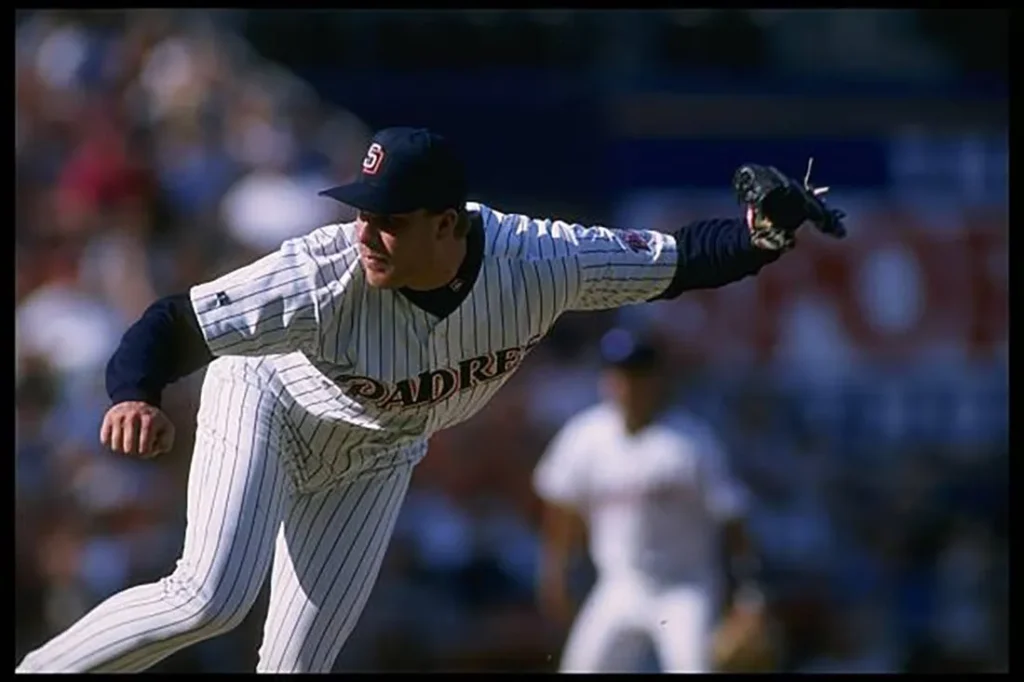
Credit: AP Photo
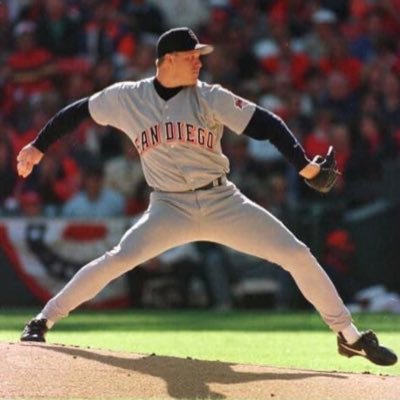
Pitcher Scott Sanders speaks with EVT about his tenure with the San Diego Padres and why he still views his time with the team as his best in the league.
Scott Sanders brings a lot of energy.
From his playing days with the Padres to his time currently at home with his family in Thibodaux, Louisianna, Sanders is full of life.
The story of Scott Sanders covers plenty of San Diego Padres royalty over the years. He befriended several former Padres and is full of great stories about them.
Kevin Towers drafted Scott Sanders in the G.M.’s first draft with the Padres as general manager. Bruce Bochy also coached the pitcher in the minor leagues and at the major league level with the Padres. Sanders played with so many Padre greats like Rickey Henderson, Kevin Brown, Ken Caminiti, Fernando Valenzuela, and, of course, Tony Gwynn. He holds a special place in Padres lore.
Affectionally known as “Sandman” or “Scooter” by his teammates, Sanders was a fierce and loyal competitor on the mound for the Padres. The right-handed pitcher with a power slider was used in and out of the starting rotation for the Padres in five seasons. Drafted in the first round (32nd overall) of the 1990 MLB Draft out of Nichols State, Sanders went 24-22 with the Padres, recording a 4.08 ERA in 118 games and 428 innings pitched.
He lived up to the expectations of a first-round pick, and some would say he exceeded them.
In 1990, after Sanders pitched a game in college at the age of 21, a young baseball scout walked up and talked to him. Kevin Towers was the area scout for the San Diego Padres at the time. “From the first get-go, me and him connected,” Sanders told EVT last week. “He would call me every week or so and check up on me. Towers was a bulldog on the mound, and he told me- you remind me of myself,” Sanders said fondly about his friend.
Kevin Towers would go on to be the scouting director of the Padres later that season, as the club selected Scott Sanders in the first round. “We were very close, and I always joked with him. I used to always tell him if it wasn’t for me, you would have never made it as a G.M. (eventually). You took Robbie Beckett and me in the first round of your first draft. Beckett didn’t make it and was a bust. If you took two first-rounders and neither one made it, you would have been done,” Sanders said with a giggle. Towers would also laugh at Sanders’ joke and tell him he was right. The two men had a great bond.
“He was a dear friend of mine and a most amazing human being. He knew how to put a clubhouse together where everyone would pull that same rope. KT found a way to put guys around each other that loved each other and fought for one another,” Sanders explains. The two men built a relationship that remained solid after Sanders’ playing days were over. In speaking about Towers’ death, Sanders noticeably spoke softer. The two men were dear friends. Scott Sanders made several connections over the years, but his time with Kevin Towers was truly unique. “He was a special man.”
As Scott Sanders was drafted, he spent a few seasons in the minors. Kevin Towers was his pitching coach for his first handful of professional starts, and Bruce Bochy managed him in a few different spots. “Boch was my A-ball manager, my Double-A ball manager, my third base coach when I made it to the majors, and my manager in the big leagues for three years,” Sanders said. The pitcher knew Bruce Bochy long before he was the Hall-of-Fame manager you see today. “Boch is a guy who lets you play baseball.” The manager is known for his ability to control a room and relate to his players.
“He gets the best out of guys. He knows how to get his point across to guys without belittling you or daggering you,” Sanders explains. “He found a way to get guys to like each other. He loved everybody. Bochy treated you like a man but also treated you like a son,” Sanders recalls about his former manager. “I tell Bochy all the time that you owe everything to me. We won titles in four out of the six years I played for him. Two in the minors (Cal League and Texas League) and two in the majors (1996 and 1998),” Sanders said jokingly. “Bochy laughs about it. He is one of my favorite humans,” Sanders said.

Our conversation took a turn towards family. Scott Sanders developed his competitive nature from his father. His dad played basketball and baseball at Nichols State in Louisiana. He was an excellent athlete and helped develop his son’s abilities on the court and the field. “My dad was the head basketball coach at Nichols State for most of my childhood. I grew up in the gym at Nichols. Basketball was my first love. I would play 15-20 baseball games during the summer and put my glove down until next season. I played basketball year-round and never put that down. My dream was always to go to Nichols to play basketball and baseball,” Sanders recalls.
Jerry Sanders is well-known at Nichols State. Scott’s dad was a heck of an athlete in his own right, but he is proud of his son. “He’s been competitive since day one,” Jerry Sanders explains. “Basically, he’s been good at every sport (he’s played),” Jerry Sanders said about his son as he was inducted into the Bayou Hall-of-Fame. Jerry Sanders knew his son was special. He made him work for his accomplishments. “My dad was hard on me because he knew that God gave me a talent, and he was not going to let me waste it,” Scott Sanders said about his father.
In speaking to former teammates with the Padres, they regard Sanders as a loyal competitor. That was instilled in him at an early age. “My dad always made sure that whatever I did was team-oriented. If I scored 33 points in a basketball game and we lost, he would push me to be better. He told me never to be satisfied with being good. You always want to be great. He also taught me that a loss doesn’t hurt as bad as long as you learn a lesson from it. If you can turn a loss into a lesson, then you are better than you were before that loss,” Sanders said. That is fantastic logic, as you will surely lose games along the way in sports. Turning those losses into life lessons is a productive way to live. His father taught him well.
As Scott graduated high school, his decision to go to Nichols State was a no-brainer. His biggest dilemma would be whether or not he played baseball and basketball in college. “Mike Knight, the baseball coach at Nichols State (1980-1996), has known me since I was 10 years old. He called me into his office right before I committed out of high school. Coach told me that if I quit basketball, I could actually make money in baseball one day. If I committed more than three months out of the year to the sport, I would be better. He asked me to go talk to my dad about it, so I did,” Sanders said.
The two men discussed his options when Scott got home. “We talked, and I really always liked to win. The basketball program at Nichols was suffering, but the baseball program was always good. We decided that I was just going to play baseball,” Sanders explains. Upon arrival at the baseball program, Sanders would be challenged early. “I thought, when I got to school, I was going to play shortstop and pitch. Coach told me I was just going to pitch, and I got a little butthurt about it,” Sanders recalls. His bringing up and his lessons in life took over as Sanders moved on. ” I got over it and focused on the mound and went from a nobody to a first-round pick. It is all blessings,” Sanders said proudly.
Cam Sanders is a minor-league prospect. Scott’s son is a pitcher, just like his dad. Cam was born in San Diego in 1996, and the 28-year-old is looking for an opportunity this coming season. The pitcher spent the last six years in the Cubs system, making all the way to Triple-A. He has struck out 500 batters in 424 career innings pitched. “I am proud of Cam. He is a minor league free agent and should be signing soon. Hopefully, he will get a chance to go to Triple-A somewhere and show what he has. If he can string together a few good weeks or months, he will get his opportunity in the big leagues. He throws 97-98 mph with a nasty slider and a good changeup. His ball just moves too much right now. I had the same problem as him at 22 or 23. The strike zone is so much tighter now than when I played. He is a great kid and works hard. I am sure he’ll get a chance somewhere,” Sanders explains about his talented son. “I coached them all throughout high school, so I never got too nervous. Now, when I watch my son Cameron on TV- it is nerve-wracking. I’m pacing in my house and throwing stuff around. Not being in control and just watching is tough. Sometimes, I’d rather just hit my big toe with a hammer.”
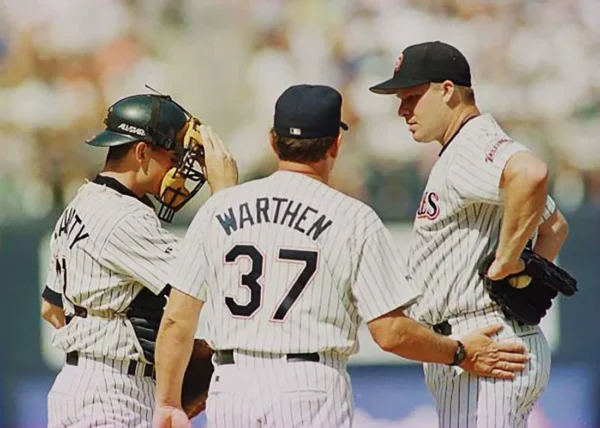
Making it to the big leagues is not as easy as some would think for a first-round pick. The adversity a pitcher faces in the minors as they climb the ladder can be a killer to some pitchers. Sanders always thrived on adversity. He loved a challenge and would constantly adjust after making mistakes. His tenure in the minors was rough at times, but one day, Scott Sanders got the call all young players dream about. “Randy Smith called me in Tacoma the day before I debuted. I was supposed to pitch that night against the Rainiers. He told me I wasn’t going to pitch that night because I was pitching tomorrow night in San Diego. I jumped up and hit my head after hearing the news. I was going to pitch the back end of a doubleheader against the Rockies. It was a dream,” Sanders said.
His debut in the majors was a special night for several reasons. Sanders did not have any nerves as he headed to San Diego. “I knew all the guys from Spring Training. Tony Gwynn had 1,999 hits when game one started. I thought for sure he would get it in that game because he never goes o-for. Sure enough, he went 0-for-3 in the first game,” Sanders said. The Rockies had a formidable lineup, but Scott Sanders was waiting for this opportunity his whole life. “Eric Young was my first batter. I walked him on a 3-2 slider. I got out of that inning without any damage. Billy Beane hits a three-run homer in the bottom of the first inning to put me up and I settled in. I even got my first big-league hit off Willie Blair. I was really proud of that. Tony got his 2,000 hit in the game, and that was amazing.” Sanders won the game in his debut, going 6.2 innings and allowing two earned runs. He punched out six Rockies in the game.
The win was memorable as he spoke about that night. But the crowd left a lasting impression on Sanders. “The thing I remember most is coming out of the game. I was so locked in. I heard the fans during the game but never paid much attention to it. After Jim Riggleman took me out of the game, I walked off the mound and heard everybody cheering. For the first time, I looked up and saw the crowd, and all I saw was 50,000 people waving towels. It was ringing. I got chills right now just thinking about it. I looked around and behind me and was amazed at the amount of people there. To debut on that special night for Tony Gwynn was amazing because he was one of my favorite teammates ever,” Sanders said.

In speaking more about Gwynn and his relationship with him, Sanders perked up, and he spoke with excitement. “What an amazing man. When my career was over, I ended up being a pretty decent hitting coach because of Tony Gwynn,” Sanders said laughingly. The two men would discuss approaches at the plate and what a hitter was looking for on certain counts. “He was always such a genuine person. I always used to sit next to Tony and Merv Rettenmund. They were both hitting geniuses. I would ask Merv why certain players couldn’t get to pitches while they were hitting. I would always sit and talk hitting with Merv and Tony.”
The former pitcher speaks more about the relationship he had with the Hall-of-Famer hitter. Gwynn took plenty of young players under his wing, and Sanders was no different. “Tony was a professional. He taught us how to take our job and make it a craft. It was a craft for him. It wasn’t just hitting. He cared about us. Tony always called me “Scooter.” Everyone else called me Sandman, but Tony called me Scooter. We bonded a lot. I miss him,” Sanders admitted about his old friend.
Gwynn was an excellent basketball player at San Diego State University, where he still holds the all-time record for assists. Sanders’s first love was basketball, and the two loved to talk about and play the sport. “Nobody knew. But we used to play basketball in the gym on Friday nights at Poway High School. Tony got the key somehow. I loved to shoot, and Tony loved to pass, so he always took me on his team,” Sanders said with joy in his voice. “We had a crew of guys. Major-league guys and a few minor-league guys would play. We played in the offseason on Sundays. Man, we would play five or six games to 15 points. I still remember we were playing one day, and Jesse Orosco went up for a rebound. He came down and twisted his ankle. We all scattered from that gym like roaches when the lights came on. That was the last time we played.”
Scott Sanders was touched by Gwynn. The two men shared a bond. “Those were good times, and Tony was a great human being. He blessed all the people he was with while he was here,” Sanders said.
Another tragic loss from that 1998 team was Ken Caminiti. Sanders’ locker was right next to Caminiti his whole tenure with the Padres. The two men shared several special moments on and off the field. “I dressed next to Cammy all my years in San Diego. Even when I was traded away and came back, he insisted that I get my locker back next to him. Cammy was a menace in the world. He was a man of few words, but he spoke his words with his actions. His stare. His reactions. Me and him would talk a lot, though. He took a liking to me when I got to San Diego, and we just bonded,” Sanders said about the former MVP.
Caminiti’s intensity is well known. Scott Sanders describes him well as he remembers his old friend. “He was a really good dude and knew only one way. I am going to be honest- We knew he wasn’t going to make it until he was old. But I don’t think he wanted to live to be old,” Sanders said with all seriousness. “A lot of guys loved him. He was a quiet leader. He talked, don’t get me wrong. But Tony spoke a lot of knowledge, and Cammy was the guy who, when he spoke, we were all like, oh shit. He would look at you with those eyes. Those blue-blue eyes, and he would pierce you with them.”
There is no doubt that everyone on the Padres team respected Ken Caminiti. “He only knew one way to play- all out. In his 1996 season, he blew out his shoulder. The only way he could pick that arm up past a certain point was by using the other arm. He terrorized the league with a blown-out shoulder,” Sanders said. In that MVP season, Caminiti put up a 1.028 OPS and slugged 40 homers while driving in 130 runs for the Padres. He played in 146 games that season and, for the most part, was in pain.
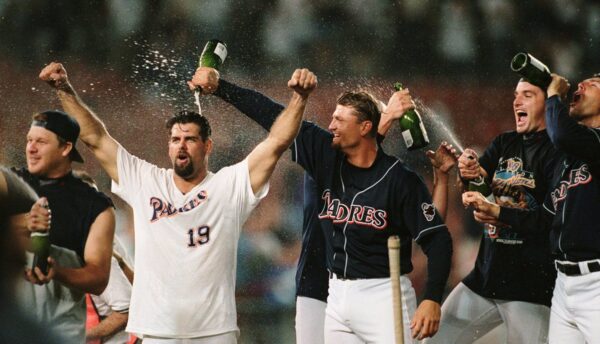
The following story from Scott Sanders exemplifies Caminiti to a tee. “I was having a rough day, and Greg Myers was catching me. I was struggling, and we couldn’t get on the same page. I wasn’t giving up a lot of runs, but the game was dragging. It was like the second or third inning, and I was on the mound, and I heard- Time! It was Cammy from third base. I was like- Oh man. He came jogging in, and I could see his face. I was scared, thinking- what did I do?” Sanders said with a giggle. “He comes up to me and says- If you shake off the catcher one more time, I am going to come over here from third base and punch you right in the jaw. You got me? I was like, okay, and he went back to his position. I didn’t shake off Myers the whole rest of the game, and it was a great game. He would always say something at the right time.”
Baseball in the 90s was a different time. Sanders was known for his loyalty on the mound and I am sure Caminiti appreciated that. The third baseman was all about the team. “I was never afraid to hit anybody in the league because I knew he (Caminiti) would get to them before they got to me. I hit a lot of guys in my career. I hit a lot of guys in my career to protect my teammates. That’s why I knew he would never let anybody get to me,” Sanders explains.
“He was a great soul. Cammy was a warrior and not a leader. Tony was the leader, and Cammy was the warrior, and you need both on a good team.”
While creating this piece, the baseball world lost Rickey Henderson. I had to get Scott’s reaction to his former teammate. The two spent some special times together while Rickey was in San Diego. “He was the best. He was one of a kind,” Sanders said about the Hall-of-Famer. “He always talked in the first person, and that was interesting. He took a liking to me. He would call me Sandy. Which nobody did.”
Sanders and Henderson’s nightly ritual would involve some time in the hot tub. The machine at Qualcomm Stadium could fit four or five players. While on the road in Montreal, Sanders noticed that the hot tub in the visitors clubhouse at Olympic Stadium was tiny and basically a one-seater. “I noticed how small it was before the game. After the game, Rickey yelled at me- ‘Hey Sandy, let’s get in the hot tub.’ I told him- did you see how small it is? We walked over together, and he said we could still fit,” Sanders said with a giggle. “Sure enough, we squeezed in there like regular. We sat in the hot tub together. Just talking about baseball and a little bit about life.” Enjoying those times with baseball royalty is a special memory for Sanders. Rickey Henderson will be missed.
Kevin Brown enjoyed one of the most dominant seasons for a starting pitcher in the history of the San Diego Padres. Scott Sanders witnessed it firsthand as he and Brown formed a special relationship as well. His teammates loved Scott Sanders, and even the hard-nosed Brown respected him dearly. “He took a liking to me. He didn’t do a lot of running. He didn’t do a lot of throwing. He played a little bit of catch, though. Brown would always come out late and tell me to play catch with him. I tell you, that was like the worst 15 minutes of my life. It was like catching a Wiffle ball,” Sanders recalls. “He was superstitious and would always get me. I would literally get handcuffed playing long toss. The worst part is he would come out late, and BP would be starting. So I got him throwing missiles at me and guys smoking balls right next to me. It was a nightmare playing catch with him, and I caught him nearly every day.”
In speaking of Brown and that 1998 season, Sanders is still in awe. “That run he went on was pretty amazing. His fastball was electric. He was a nasty dude. He was a fierce, fierce competitor,” Sanders said. “When he didn’t have a good outing, that bathroom was in trouble. He broke many sinks and toilets. He broke coolers. Man, he was one fiery competitor. He was a little different. Browny was a good dude, though. I would describe him as a laid-back country boy on his off days when he didn’t pitch. But, when he got on the mound, he was like a pitbull foaming at the mouth. You would go by and give him a nudge or pat him on the back, but you’d never talk to him on the days he pitched. His bottom chin poked out a little more on those days. When he got out on the mound and looked at the catcher, it was like a death stare. That year, nobody wanted to face him.”
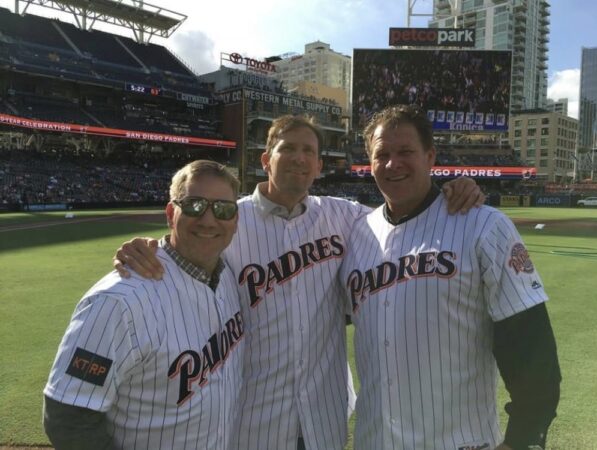
Undoubtedly, Scott Sanders hung out and interacted with Padres’ royalty. His lasting friendships with that team are still dear to him. That 98 team gets together every once in a while and reminisce about the gold ole days. Qualcomm Stadium is sadly not there anymore, and Sanders spoke about it. “It felt like home. The beach chairs in the bullpen, The palm trees in the outfield. It was San Diego. It was my office. I grew up in that stadium. I have been to Petco a few times and would have loved to play there. But that place was my home,” Sanders said.
In 1996, the San Diego Padres made the playoffs for only the second time in the history of the franchise. Sanders was right in the middle of that season. “That was the best year of my career. I went off. That was my favorite full season as a professional baseball player,” Sanders said proudly. The right-hander went 9-5 with a 3.38 ERA and a 1.146 WHIP in 46 games and 16 starts. Sanders struck out 157 batters in 144 innings and threw well for the team in the rotation down the stretch.
“The 1996 season was amazing. It was one of those seasons when nobody expected us to do much. We were doing okay, and then we just got on this run. I still remember Bochy telling us we could make a run in the playoffs. We got hot at the right time,” Sanders explains. “We were down two games heading into LA for the last series of the season, and I was starting Friday night, the first game. The season was literally on my shoulders. I still remember it like it was yesterday. Dodger fans were yelling at me in the bullpen as I warmed up. They were calling me every name in the book. It just fueled me so much. I just focused more. I went out and pitched about eight innings, and we won a close game. Andy Ashby won on Saturday, and Bob Tewksbury pitched one of the best games of his career on Sunday. We got to celebrate at Dodgers Stadium. That was probably my favorite series in my whole pro career.”
That 1996 season was special, even though the Padres lost in the playoffs. The conversation turned towards the current team and the feeling of seeing the Padres as a relevant franchise. “Talent-wise, they are uber-talented. Unfortunately, uber-talented doesn’t always translate to playoff wins. The perfect example is a player like Chris Gomez, who probably wouldn’t even make the current Padres roster. I, myself, may not even make the bullpen roster,” Sanders said. We spoke more about chemistry and the importance of it when constructing a roster.
“Sometimes, it is more about the puzzle pieces fitting than the pieces themselves.”
Each and every roster must have players who know their role. It takes each kind of personality and commitment to the game to produce a winning squad. “The game nowadays is hard. There is talent everywhere. The game is a marathon, and the chemistry must last the whole season. I enjoy watching the Padres. They have a good manager, and Preller doesn’t mess around. The owners are spending money. It is a good time for the Padres,” Sanders explained about the Padres.
He considers himself a Padre for life. And why shouldn’t he? The man played with some of the greats and held lasting relationships with them. Petco Park is a dream ballpark for Scott Sanders. He loves it. “I go back whenever I can. That stadium is a fun place to go. I like the team. I hope this year they can find a way to break that Dodger curse. They have the pieces to win,” Sanders said.
In San Diego, Sanders built core memories that can never be reproduced. His time on the mound was excellent, but he points towards the clubhouse and the comradery within it, which is what he misses most about his time in San Diego. Sanders loves America’s Finest City. He has a special message for the fans. “You were always my favorite. You will always be my favorite. You have always been great to me, and I miss you. We took the field each day to win, and we did that for the Padres fans.”
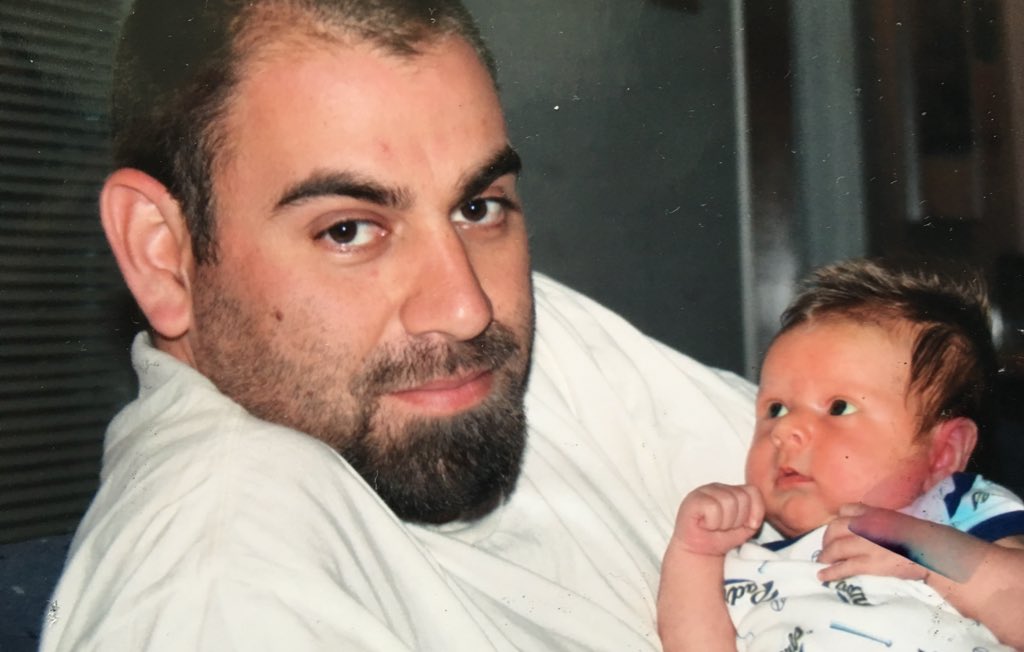
James was born and raised in America’s Finest City. He is a passionate baseball fan with even more passion towards his hometown Padres. James has written about the Padres and their prospects for over a decade. He also writes about San Diego State as well as other local sports. James is the Editor-In-Chief of EastVillageTimes.com. Always striving to bring you the highest quality in San Diego Sports News. Original content, with original ideas, that’s our motto. Enjoy.